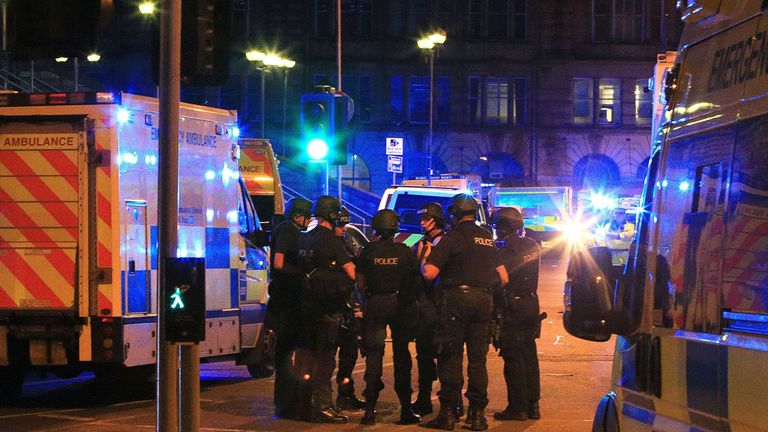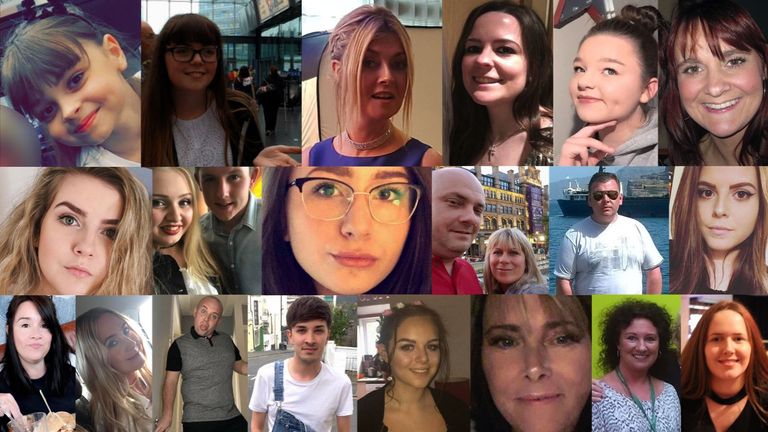Manchester Arena attack: Fire service officer 'not aware he was in charge'
The officer was 22 miles from the fire station rendezvous and did not arrive until more than an hour after the explosion.
Wednesday 10 February 2021 18:38, UK
The senior fire officer on duty on the night of the Manchester Arena attack, was "not aware he was in charge", the inquiry into the bombing has heard.
Station Master Andy Berry, the national inter-agency liaison officer (NILO) appointed that night, was at home, 22 miles from the fire station rendezvous, and did not arrive until 11.41pm, an hour and 10 minutes after the attack in May 2017.
Greater Manchester Fire and Rescue Service (GMFRS) did not deploy to the arena for more than two hours after the attack and crews were not available to help evacuate the casualties who had to be carried out on crowd control barriers.
The inquiry heard the fire service could have sent two specialist response team vehicles with 12 specialist responders and 10 "fact action" stretchers between them.
Station Manager Michael Lawlor, a contingency planning manager for GMFRS, said that during Mr Berry's drive across Manchester, the senior officer was "unaware he was in charge" of the incident for the fire brigade.
The inquiry chairman, Sir John Saunders, asked Mr Lawlor if there was any guidance about what should have been done in such a situation.
Mr Lawlor told the inquiry: "I believe there is guidance in the major incident plan. The NILO on the night recognised he was facing difficulties and did request to further NILOs who were closer to attend the rendezvous point."
When asked if there was a way for the NILO to hand over, Mr Lawlor replied: "There is an opportunity to scrutinise in the way the NILO number one was being in charge, but I do not believe he was in charge. He was unware he was in charge."
He added: "We would liaise with each other, text each other. It would not be unusual if we realised we were further away, I would contact North West Fire Control and ask them to contact a closer NILO and I believe that occurred on the night."
The inquiry has heard two other NILOs turned up at Phillips Park fire station, two miles from the arena, which had been designated as the rendezvous point by the fire brigade.
The fire service has blamed the delay in responding on their inability to get hold of the police force duty officer to find out what was happening.
John Fletcher, the fire service head of resilience, described how at one exercise, the police thought the fire brigade were "there to deliver a vehicle for the exercise rather than to participate".
He said that the police tactical firearms commander "climbed into the specialist response team" vehicle "and shut the door".
After a table-top exercise called Hawk River in March 2017, two months before the attack, there was a discussion about how the police force duty officer had not stayed in touch with the other services.
The fire service suggested keeping an Airwaves radio channel open so that there was an "unbroken communications loop".
Mr Fletcher said the police officer told them that in the case of a marauding terrorist firearms attack, the method the police considered the most likely form of attack: "I will be really busy. You will be lucky to get in contact because I have so much other things to do."
The fire service went ahead and set up a channel for the police, fire and North West Ambulance Service (NWAS), but the police still had some "loose ends to tie up" and it was not operational on the night of the attack.
On another exercise called Winchester Accord in May 2016, a year before the attack, the police did not contact the fire brigade and it was an hour and a half before they deployed to the scene.
Mr Fletcher said that "once the police had neutralised the threat, they called an end to exercise" which meant the other services could not practise evacuating casualties.
The inquiry continues.




